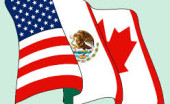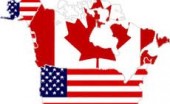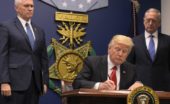Molly Minturn - My family is heartbroken to share that my father died in surgery on Monday, Feb. 10. It…
Wednesday Night #1367
Written by Diana Thebaud Nicholson // May 14, 2008 // Agriculture & Food, Americas, Asia, Canada, China, Economy, Foreign Policy, Global Markets, Government & Governance, Herb Bercovitz, Infrastructure, Investment, Natural Disasters, People Meta, Reports, Rights & Social justice, United Nations, Wednesday Nights // 4 Comments
NAFTA/Mexico
The North American Free Trade Agreement (NAFTA) has proven beneficial to both United States and Canada, but apparently less so to Mexico where companies, even large ones, are mostly family owned and the personal financial well-being of many Mexican families depends, to a great extent, on Mexican expatriates sending money home from the U.S. Political, as well as economic, problems persist there. The contrast in benefits to Mexico with those to Canada and the U.S. raises the question of the utility of including Mexico in NAFTA. One explanation offered is that it was intended to serve as a physical buffer between the U.S. and Central and South America’s economic and social problems. But NAFTA has not turned Mexico into a stable, developed country (although the early years were promising – http://www.mexidata.info/id1828.html ; it is riddled with corruption and is on the brink of becoming a failed state. Is there anything that we (Canada, the U.S.) can or should be doing to stave off disaster?
Despite the demonstrated benefits of NAFTA, there is an obvious need for improvement, particularly in the area of arbitration procedures. The U.S. has consistently refused to respect current procedures.
‘The Responsibility to Protect’
The apparent inability of United Nations members to intervene in the physical destruction and human devastation caused by the recent cyclone in Myanmar is inexcusable to many Wednesday Nighters. Indeed, the world’s population has been touched by the tragedy in that country, including in addition to the overwhelming size of the problem, the destruction of the land, and the resulting disease and death of an incredible number of Burmese despite the will of many nations to intervene with food, supplies and manpower. But, the Burmese Junta refuses to allow western – and indeed most foreign – troops and aid workers into the country and U.N. rules forbid the invasion of one member country by another without its consent. The Junta has indicated that air drops by Thai planes would be acceptable, but not those from U.S. planes. Indeed, in a country in which human rights are minimal if not inexistent, it would not be unusual for the citizens in a dire state of deprivation, to bond with foreign aid givers and rise up against a cruel, corrupt regime. In such circumstances, citizens so deprived, might very well bond with their benefactors and rise up against their government. The history of this phenomenon has been so frequent that nations offering help under the United Nations flag find themselves present over the long term, not a great idea for the U.S. and its allies at this point.
Even before the cyclone, Burma was a failed state, the ruling Junta either not able or willing to protect the people. If the western nations unilaterally moved in, it would imply the recognition that Burma has no valid government. What might very well occur if the U.N. or U.S. went in to take care of the humanitarian problem is that either an uprising against the Burmese military would follow, or that once there, the western powers, lacking an ‘exit strategy’ would find it impossible to extricate themselves
On the other hand, we need look no further than the relief provided to Banda Aceh by the U.S. military in the wake of the 2004 tsunami. The similarities include an unstable region and oppressive central government; the U.S. Navy had a carrier off shore, military helicopters ferried material and people to land. When the task was accomplished, they left, saying in effect “we were here to help the people and now we are going”.
Wednesday Nighters who recognize the problem express the view that the enormity of the tragedy warrants providing the aid to the Junta, accepting the corruption and inefficiency of that route.
Canada’s Minister of Foreign Affairs
Although democracy is without doubt the best form of government for the population it serves, it is important to understand and accept certain imperfections. It is in the best interest of opposition parties to recognize and magnify lacunae in the personages and policies of the party in power. While Maxime Bernier’s appointment to Foreign Affairs was an unfortunate one, one for which he had obviously not been properly prepared, his stint as Minister of Industry had been outstanding, one in which he effected many important changes, particularly in the area of working with the CRTC to reduce overregulation in the area of telecommunication. What puzzles many people around the table is that traditionally the Foreign Affairs portfolio has been reserved for outstanding ministers, whereas it appears that in the Harper government it is relegated to a secondary role.
The Economy
In the opinion of one Wednesday Night expert “the last 4 months have been the toughest market I have ever gone through in 50 years – with so much volatility” Year-to date averages show Europe, Southeast Asia, China, the U.S. – all down – .
Banks remain a major concern. Large write-downs have been reported and more may be expected.
On the financial scene, as we near the end of the second quarter, many companies are reporting better than expected earnings. There was a significant rise in the market towards the end of January, particularly resources & energy, and a new high in Canada recently. A consolidation is predicted in the next few months awaiting signals indicating the direction that earnings will take during the third quarter. There will be some hesitation in the next few months in Southeast Asia where rising inflation, energy and food prices may adversely affect the market. Continue to ‘expect the unexpected’.
In the U.S., second quarter results will probably be better than expected, with a significant level of exports. The challenge is to determine the asset mix in which to invest.
Experts are worried about currencies; they feel that the Euro is too high and could easily drop back to $1.30-1.35 and the pound is having a difficult time, down from $2.10 -1.94 too low (“Get your currency right and the rest will follow”) and commodities, high with the exception of gold. Southeast Asia has had a terrible quarter. The immediate future appears to indicate a volatile time in currency and interest rates, reminiscent of the ‘70s stagflation era. Especially with expected multiple mergers and acquisitions, Canada remains very fertile ground for investment, albeit with greater volatility than witnessed in the past half century. The greed factor in commodities and riskier investments has returned, especially in commodities and riskier investments, and so advice for investors would be to conserve cash in order to await and recognize opportunity.
Canada continues to profit from its development of oil and gas reserves. Brazil’s Petrobras claims to have discovered oil five miles under water, ultimately a reliable source when increasing price warrants its exploitation. The discovery is not surprising given that the deltas of the Amazon and Niger Rivers are geologically identical. The technology for drilling in deep water is available and already in practice in Mexico, but the oil in the Brazilian field is heavy oil, making it very expensive. Although Russia is doing well because of its oil and gas, it is in dire need of improved physical and governance infrastructure.
T H E I N V I T A T I O N
Last Wednesday Night’s discussion encompassed lunar-based solar technology, reports by Kimon of exciting developments in the New School of Athens global governance initiative, the environment, the economy and, of course, acclamation of the publishing achievement that has given birth to The Metropolitain. It was a full and challenging evening which we will hope to rival this week, once again in the company of favorite economists and other brilliant contributors. We look forward to a report from Tony Deutsch and Gerald Ratzer on “Our trip to Huntsville, Alabama, home of the Marshall NASA Space Center”, as we are curious about the relationship of their trip to the Pension Fund. Were they Chil Heward’s avatars? We also look forward to comments on the general sentiment regarding the U.S. economic outlook, as last week’s discussion was gloomy and seems matched by recent statements by Ben Bernanke
This week’s events have generally added to our gloom.
Burma and China suffering from natural disasters with such a difference in their handling of the events. As the Generals in Burma maintain their intransigent opposition to foreign aid workers and underestimate the horrific statistics of death and devastation,Chinese Premier Wen Jiabao rushed to comfort survivors and direct rescue efforts. Foreign aid agencies are welcomed and all news sources are reporting every detail, including the indispensable bloggers in the more inaccessible areas China has earned praise for “exemplary” response to disaster, in comparison to the “callous” response of the Burmese authorities.
We see that Maxime Bernier has had his gag removed in order to deliver a no doubt carefully scripted message that “Canada is pushing the United Nations Security Council to press Myanmar’s military dictators to permit international aid to reach cyclone victims.” The National Post adds that “the Conservative government faces mounting pressure to back the UN’s ‘responsibility to protect’ doctrine — one that Canada pushed the world body to adopt — which calls on the international community to essentially invade the sovereign territory of a country if its government is not protecting its people.”
Once again the government is leading from the rear. But in any event, as we understand it, the Responsibility to Protect was not designed to force countries to accept international humanitarian aid and does not (yet) have standing under international law. (The Responsibility to Protect populations from genocide, ethnic cleansing, war crimes and crimes against humanity is an international commitment by governments to prevent and react to grave crises, wherever they may occur. In 2005, world leaders agreed, for the first time, that states have a primary responsibility to protect their own populations and that the international community has a responsibility to act when these governments fail to protect the most vulnerable among us.) For those who want to know more, a good place to start is World wrestles with Burma aid issue.
Amid disasters, UN ponders its “responsibility to protect”
Myanmar’s rejection of most international aid following the devastating cyclone, and China’s rejection of some assistance in the wake of Monday’s deadly earthquake are putting to test the United Nations’ “responsibility to protect.” The doctrine, implemented in 2005, directs the world body to intervene against crimes against humanity. France’s UN Ambassador Jean-Maurice Ripert has urged the doctrine be applied to deliver mass-scale aid to Myanmar’s people despite the regime’s opposition, but others say such an approach is riddled with geopolitical difficulties. Los Angeles Times (free registration) (5/14) , The Wall Street Journal (subscription required) (5/14)
Zimbabwe‘s escalating violence bodes ill for the presidential run-off. Why is no-one advocating some form of ‘the responsibility to protect’ in Zimbabwe. Surely the long-suffering citizens deserve the help that their fellow Africans are unable or unwilling to deliver. As someone asked us recently: if the U.S. could invade Iraq because Sadam was oppressing his countrymen, why is there no move to do the same in Burma/Myanmar and Zimbabwe? Oh, we forgot. Neither country has oil. [We erred: see Comment 1)
As Israel celebrates 60 years of statehood, Lebanon lurches into another crisis that has precipitated a round of namecalling between Saudi Arabia and Iran in what Robert Fisk terms Iran’s proxy war with the U.S.
Closer to home, Nathan Gardels warns that While US Focuses on Iraq, Mexico is Collapsing “Any political scientist will tell you that the definition of a failed state is where the legitimate authorities have lost both their monopoly over violence and their fiscal effectiveness — the capacity to compel their subjects to pay enough taxes so the state can function. Mexico is a failing state on both counts. While all our attention is focused on Iraq, our neighbor is descending into Hobbesian chaos.” See Stratfor Mexico: Examining Cartel War Violence Through a Protective Intelligence Lens
World hunger – as someone remarked last week “There is much talk but seemingly little action” We would like to draw your attention to a feel-good story Students Fight Hunger with Internet Game about a wonderful initiative” freerice.comthat permits us all to act in a small, but entertaining way.
Is there any good news? Serbia’s pro-West election results. Governor General Michaelle Jean’s triumph in France and conquest of President Sarkozy (we doubt that the PM or any of his male colleagues could have achieved the same effect). We are not yet sure how we would view the changing of the guard in Russia. Will President Dmitry Medvedev be a force for liberalizing – will Premier Putin allow him to be? Like the rest of the world, we’ll wait and watch. Depending on your view, the demise of Hillary Clinton’s campaign is fast approaching despite her win in West Virginia, which was widely expected. On a note of lesser global import, the ADQ has seemingly tanked in Québec. Jenna Bush got married in what appears to have been a small-ish tasteful ceremony presided over by a minister who is an Obama supporter. (Huffington Post reports with glee that her husband will be working at Constellation Energy, the 33rd worst corporate air polluter in the United States, which has filed an application with the Nuclear Regulatory Commission to build the first nuclear power plant in America, construction by Bechtel). Meanwhile, Autumn Kelly of Pointe Claire is to wed Peter Phillips at Windsor Castle in a slightly more upscale event. Not quite sure how we should react to the news that Vatican says aliens could exist, as long as they don’t unionize to impede progress on the lunar-based solar energy program ….
Finally, how many of you saw the item “. President Bush has for the first time revealed the great sacrifice he’s made for the sake of our soldiers: he’s given up golf. “I think playing golf during a war just sends the wrong signal” —- words fail us!




4 Comments on "Wednesday Night #1367"
WE STAND (SIT?) CORRECTED by Cleo, our indefatigable fact checker
BTW Burma does have oil and gas: hence the strong relationships with both China and India.
Also, while the press in the West was saying ‘no aid is being allowed in’ to Burma, India had sent their army, air force and navy, including four warships and helicopters, all of which was allowed in.
The purpose of this note is to clarify geography. Gerald and I went to Huntsville, Ontario, not Alabama. The only objects approaching spectacular trajectories there are small, round, white, and originate on golf tees.
Cheers, Tony
On invoking The Right to Protect
“Given the country’s history, there is no way European troops could go into Zimbabwe, and Asia is maneuvering for advantage on the continent, which leaves it to Africa. But there are a lot of dictators in Africa who wouldn’t want to set up the precedent.”
Another voice: “I would have loved to attend the Responsibility to Protect discussion. The question of its status goes to fascinating debates about the nature of law. I always found this to be a spooky and unsettling topic as the discussion leads us to question the basis and legitimacy of our social order.”
The credit crisis claimed the career of another important banker when Ken Thompson was asked to quit as chief executive of Wachovia “at the request of the board”. America’s fourth-biggest bank has come under withering criticism from shareholders over its earnings, which have been particularly hurt by its $25 billion takeover, at the peak of the housing boom, of Golden West Financial, a mortgage lender based in California.
Bradford & Bingley, a British bank, announced that it would renegotiate the terms of a recent rights issue to avoid “a fight with the underwriters”, and was selling a 23% stake to Texas Pacific Group, a private-equity firm. With the housing market slowing, the news was taken as a portent for other British lenders, causing their share prices to fall sharply. See Economist